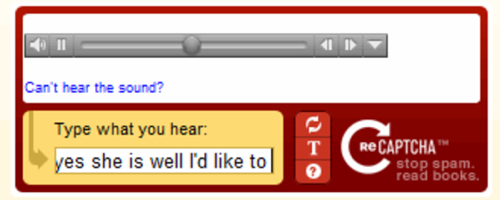As we have reported before, the reCAPTCHA service, which is based at Carnegie Mellon University, is not only an easy way to keep spammers away from your web sites, but is also an interesting experiment in harnessing human intelligence to transcribe old texts. To enable those with visual impairments to access those sites that utilize this system, the reCAPTCHA team has now also launched an enhanced audio version of the service, which will be used to transcribe old radio shows that speech recognition technology is not yet able to transcribe.

Security
As the team points out in a recent blog post, traditional audio CAPTCHAs based on distorted digits or letters are relatively vulnerable to automated attacks and can be broken by using machine learning algorithms. Indeed, Wintercore Labs, an IT security firm, showed how easy it would be to break Google’s audio CAPTCHA solution earlier this year.
Transcribing Old Radio Shows
By using old audio clips, however, ReCAPTCHA is circumventing these security problems (you can here an example of these clips here by clicking on the speaker button).

One problem with this type of CAPTCHA, however, is that a lot of these clips are quite hard to solve – especially because a lot of them are from radio plays and feature different voices within a single clip, as well as the occasional audio effect. Most of the clips are about ten words long.
The reCAPTCHA team acknowledges this problem by allowing a certain amount of misspellings and other mistakes, but even with some practice, we still didn’t get far beyond solving every third CAPTCHA correctly (but then, a lot of visually impaired users might be more sensitive to picking up these audio clues). If you did better, let us know in the comments.

















